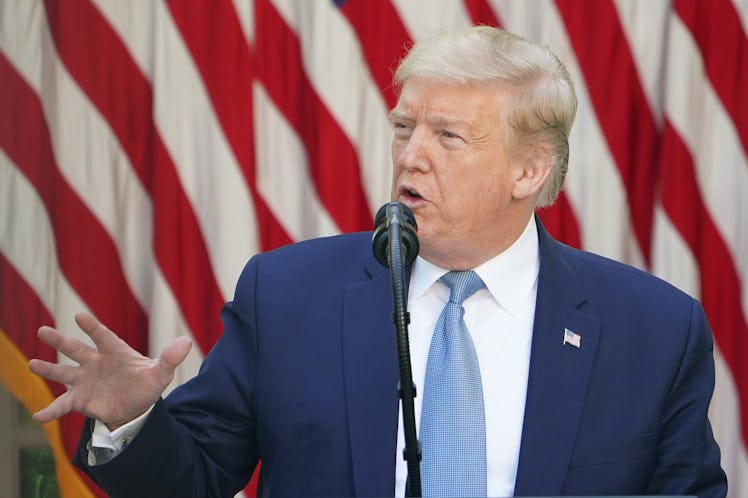
You Don't Need To Cancel Your Election Day Plans Because Of Coronavirus
As the coronavirus pandemic in the United States continues as of May 19, many have states have taken unprecedented steps to keep their residents safe during their everyday lives — and the ongoing presidential election. With all the uncertainty about the ongoing coronavirus shutdown, people understandably have a new question: Will the 2020 election be canceled? Let's just say you shouldn't change up your plans yet.
During the coronavirus pandemic, in-person voting has become inherently problematic. As the virus is believed to spread via close person-to-person contact, health officials recommend maintaining a social distance of six feet from others, as well as frequent hand washing — which is not always possible in crowded public spaces like polling places. While many public areas and businesses have shut down, states are still trying to figure out what to do about their planned elections, including the 2020 general election in November. Some states have adopted expanded vote-by-mail programs so that voters don't need to show up at physical polling locations, while others have postponed their primaries. Meanwhile, on May 12, White House adviser and presidential son-in-law Jared Kushner drew criticism for telling TIME that he was "not sure" he could confirm that the 2020 general election would take place as planned. As a White House staffer, Kushner has no authority over election dates, and the White House did not immediately respond to Elite Daily's request for comment regarding any potential delay in election dates.
However, the date of the presidential election is not arbitrary, and it's extraordinarily difficult to change. In 1845, Congress passed a federal law designating the first Tuesday after the first Monday in November as Election Day, and it's been that way ever since. The law was passed with farmers in mind: November was one of the only times of year that didn't interfere with the harvest, but it wasn't quite winter, so people were still able to travel to their polling place easily. As for picking a Tuesday — according to HISTORY, lawmakers needed to accommodate people who had to travel long distances to vote, and with church on Sundays and market day on Wednesdays, Tuesdays made the most sense for communities in which traveling to vote could be a two-day affair.
Given that the date of a presidential election is established by federal law, changing it would not be easy, per The New York Times. In order to postpone or cancel an election, Congress would need to pass new legislation, the president would need to sign off on it, and it could still face legal challenges in the court system. In short, the president cannot unilaterally decide to change or postpone a general election date.
Besides the fact that passing controversial legislation is already an onerous process, it is extremely unlikely that the Democratic-led House of Representatives would sign off on postponing an election, especially one in which they are striving to unseat Trump. Plus, the Constitution requires the new Congress to be sworn in Jan. 3, and the new president's inauguration must take place on Jan. 20.
With such a tight turnaround, it would be even more difficult for lawmakers to postpone the election — and even if they were able to, Trump would not be able to stay in office unless the Electoral College voted to re-elect him. In theory, if lawmakers postponed the general election past January 2021, the president and vice president would both have to vacate their offices, which could make House Speaker Nancy Pelosi the acting president.
None of this is even remotely likely given the makeup of Congress right now. However, critics have already claimed that Trump is planning to either make it harder for people to vote, or to decry election results as "rigged" if they aren't in his favor. Former Vice President Joe Biden, who is the presumptive Democratic nominee in this election cycle, suggested during an April fundraiser that Trump would try to come up with some rationale for why the election couldn't be held. Trump also appeared to indicate his support for voter suppression tactics in a March 30 appearance on Fox & Friends. “The things [the Democrats] had in there were crazy," Trump said of Democratic voting proposals introduced to make it easier to vote during the ongoing coronavirus pandemic. "They had things, levels of voting that if you’d ever agreed to it, you’d never have a Republican elected in this country again." The White House did not immediately respond to Elite Daily's request for comment on the remark, or the president's stances regarding the 2020 election.
While the state of the election is always concerning, there's virtually no chance that the 2020 general election will be postponed or canceled. Many states have already started rolling out plans to make vote-by-mail more accessible in light of the coronavirus pandemic. If you live in a state that still has stringent requirements for voting by mail, you should still be able to vote at a physical polling location while taking certain precautions to keep yourself and your neighbors safe.
If you think you’re showing symptoms of coronavirus, which include fever, shortness of breath, and cough, call your doctor before going to get tested. If you’re anxious about the virus’s spread in your community, visit the CDC for up-to-date information and resources, or seek out mental health support. You can find all Elite Daily's coverage of coronavirus here.
This article was originally published on